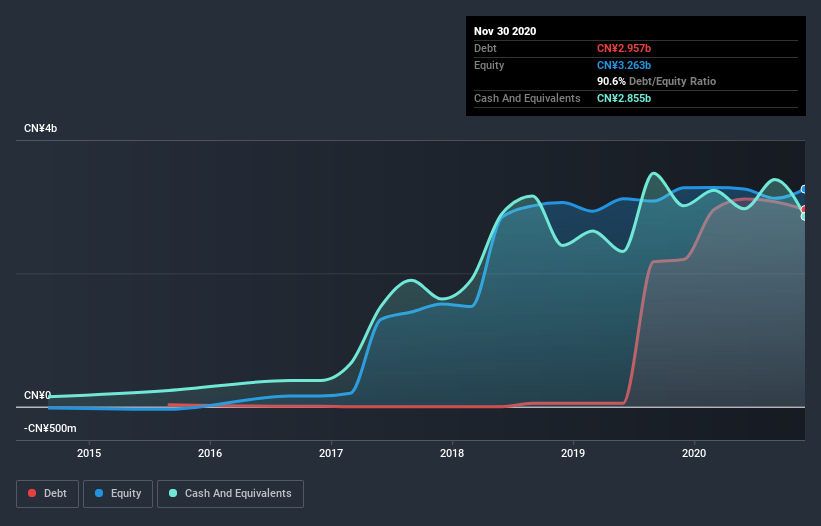- United States
- /
- Consumer Services
- /
- NYSE:BEDU
Is Bright Scholar Education Holdings (NYSE:BEDU) A Risky Investment?

David Iben put it well when he said, 'Volatility is not a risk we care about. What we care about is avoiding the permanent loss of capital.' So it might be obvious that you need to consider debt, when you think about how risky any given stock is, because too much debt can sink a company. We note that Bright Scholar Education Holdings Limited (NYSE:BEDU) does have debt on its balance sheet. But the more important question is: how much risk is that debt creating?
When Is Debt A Problem?
Debt is a tool to help businesses grow, but if a business is incapable of paying off its lenders, then it exists at their mercy. Part and parcel of capitalism is the process of 'creative destruction' where failed businesses are mercilessly liquidated by their bankers. However, a more common (but still painful) scenario is that it has to raise new equity capital at a low price, thus permanently diluting shareholders. By replacing dilution, though, debt can be an extremely good tool for businesses that need capital to invest in growth at high rates of return. The first thing to do when considering how much debt a business uses is to look at its cash and debt together.
View our latest analysis for Bright Scholar Education Holdings
What Is Bright Scholar Education Holdings's Net Debt?
As you can see below, at the end of November 2020, Bright Scholar Education Holdings had CN¥2.96b of debt, up from CN¥2.21b a year ago. Click the image for more detail. However, it does have CN¥2.85b in cash offsetting this, leading to net debt of about CN¥101.7m.

How Healthy Is Bright Scholar Education Holdings' Balance Sheet?
According to the last reported balance sheet, Bright Scholar Education Holdings had liabilities of CN¥3.06b due within 12 months, and liabilities of CN¥3.84b due beyond 12 months. Offsetting this, it had CN¥2.85b in cash and CN¥228.5m in receivables that were due within 12 months. So its liabilities total CN¥3.82b more than the combination of its cash and short-term receivables.
This deficit is considerable relative to its market capitalization of CN¥4.90b, so it does suggest shareholders should keep an eye on Bright Scholar Education Holdings' use of debt. This suggests shareholders would be heavily diluted if the company needed to shore up its balance sheet in a hurry.
We use two main ratios to inform us about debt levels relative to earnings. The first is net debt divided by earnings before interest, tax, depreciation, and amortization (EBITDA), while the second is how many times its earnings before interest and tax (EBIT) covers its interest expense (or its interest cover, for short). This way, we consider both the absolute quantum of the debt, as well as the interest rates paid on it.
With net debt sitting at just 0.20 times EBITDA, Bright Scholar Education Holdings is arguably pretty conservatively geared. And it boasts interest cover of 8.9 times, which is more than adequate. On the other hand, Bright Scholar Education Holdings's EBIT dived 17%, over the last year. We think hat kind of performance, if repeated frequently, could well lead to difficulties for the stock. When analysing debt levels, the balance sheet is the obvious place to start. But ultimately the future profitability of the business will decide if Bright Scholar Education Holdings can strengthen its balance sheet over time. So if you want to see what the professionals think, you might find this free report on analyst profit forecasts to be interesting.
Finally, while the tax-man may adore accounting profits, lenders only accept cold hard cash. So we always check how much of that EBIT is translated into free cash flow. Over the last three years, Bright Scholar Education Holdings actually produced more free cash flow than EBIT. That sort of strong cash conversion gets us as excited as the crowd when the beat drops at a Daft Punk concert.
Our View
Both Bright Scholar Education Holdings's ability to to convert EBIT to free cash flow and its net debt to EBITDA gave us comfort that it can handle its debt. In contrast, our confidence was undermined by its apparent struggle to grow its EBIT. When we consider all the factors mentioned above, we do feel a bit cautious about Bright Scholar Education Holdings's use of debt. While debt does have its upside in higher potential returns, we think shareholders should definitely consider how debt levels might make the stock more risky. When analysing debt levels, the balance sheet is the obvious place to start. However, not all investment risk resides within the balance sheet - far from it. We've identified 4 warning signs with Bright Scholar Education Holdings (at least 1 which is a bit concerning) , and understanding them should be part of your investment process.
Of course, if you're the type of investor who prefers buying stocks without the burden of debt, then don't hesitate to discover our exclusive list of net cash growth stocks, today.
If you decide to trade Bright Scholar Education Holdings, use the lowest-cost* platform that is rated #1 Overall by Barron’s, Interactive Brokers. Trade stocks, options, futures, forex, bonds and funds on 135 markets, all from a single integrated account. Promoted
Valuation is complex, but we're here to simplify it.
Discover if Bright Scholar Education Holdings might be undervalued or overvalued with our detailed analysis, featuring fair value estimates, potential risks, dividends, insider trades, and its financial condition.
Access Free AnalysisThis article by Simply Wall St is general in nature. It does not constitute a recommendation to buy or sell any stock, and does not take account of your objectives, or your financial situation. We aim to bring you long-term focused analysis driven by fundamental data. Note that our analysis may not factor in the latest price-sensitive company announcements or qualitative material. Simply Wall St has no position in any stocks mentioned.
*Interactive Brokers Rated Lowest Cost Broker by StockBrokers.com Annual Online Review 2020
Have feedback on this article? Concerned about the content? Get in touch with us directly. Alternatively, email editorial-team (at) simplywallst.com.
About NYSE:BEDU
Bright Scholar Education Holdings
An education service provider, operates and provides K-12 schools and complementary education services in China, the United Kingdom, Hong Kong, the United States, and Canada.
Good value with adequate balance sheet.

